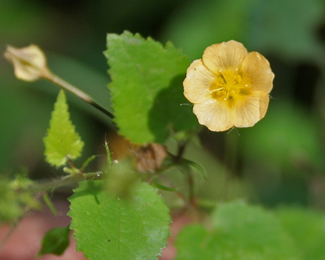Nagabala, Snake Mallow (Sida Veronicaefolia) – Properties, Benefits & Dosage

Description of Plant
Nagabala (Sida Veronicaefolia) is a hairy herb with coarsely gray, brown colored hairy branches. Leaves are cordate, ovate and sparingly hispid with 6-14 cm length and 2-3.5 cm in width. Flowers are axillary, solitary, or borne in pairs or in small cymes. Color of flower is White, gradually turns yellow and brown color appear when they fully grown. Fruits are small sized and also yellow in color. Seeds are of brown color. Herbs bear the fruits and flower throughout the year.
Two plants are mainly used with this name:-
- Nagabala – Sida veronicaefolia
- Gangeruki – Grewia hirsuta
Gangeruki and Guda sarkara may be the two species of Grewia i.e Grewia populifolia and Grewia hirsuta respectively. Therefore Nagabala can be accepted as sida veronicaefolia.
General Description
This herb is considered as the nervine tonic and offers with various other health benefits. It acts as the aphrodisiac and anti-aging herb. Naga bala is packed with demulcent, anti-acidic, expectorant, antipyretic, diuretic, aphrodisiac, carminative and cardiac properties. It is used in treating bleeding disorders, dysuria. It acts as aphrodisiac and anti-aging herb. This is quite useful herb to treat the bleeding disorders and dysuria. These biochemical compounds – β- Phenenthylamines, Quinazoline, Gossypol, Sterculic acid and Linoleic acid present in nagabala which are loaded with numerous health benefits for human beings.
Classification
- Kingdom – Plantae
- Order – Malvales
- Family – Malvaceae
- Sub family – Grewioideae
- Genus – Grewia
- Speices – Hirsuta
Habitat
This herbs is found in East Asia such as India, Srilanka, Thailand, Myanmar, Vietnam, etc. It is grown in hotter parts of India. It grows in tropical countries, but can also grow in stony and hilly regions. But abundantly found in Bihar, Vindhya Pradesh, Rajasthan and Konkan.
Names
- Latin name: Sida Veronicaefolia
- Sanskrit name: Gangeruki, Vishvadeva, Jhasha, Kharagandhika, Khanda, Hrasva Gavedhuka, Nagabala, Ganngeruki, Khargandhinika, Arista.Kala, Sita bala, Udanika. Mahasamga, Vrisharuha, Valadwaya, Vridhivala, Bhoomibala
- English: Heart leaf fan petals, snake mallow.
- Hindi: Bananiyar, Bhyunli bhuinii
- Tamil: Palampasi
- Marathi: Nagabala
- Gujarati: Gangeti
- Bengali: Goraksha chakule
- Telugu: Gayapaaku, bekkinata legida
- Kannada: Nagabala, Turuvegida
- Malayalam: Vallikkuruntotti, Nagabala.
Ayurvedic Properties
| Hindi / Sanskrit | English | ||
| Rasa | Madhura, Kasaya | Taste | Sweet, Astringent |
| Guna | Guru, Snigdha, Pichhila | Physical Property | Heavy, Unctuous, Sticky |
| Virya | Sheeta | Potency | Cold |
| Vipaka | Madhura | Metabolic Property (After Digestion) | Sweet |
Effects on Doshas
It balances vata and pitta doshas.
Classic Categorization
| Charak Samhita | Sushrut Samhita |
| Nil | Nil |
References
The Bhavprakash nighantu with elaborated Hindi commentary by Padmashri prof. K.C. Chunekar, edited by Late Dr. G.S. Pandey: edition of 2010: page no- 371-372.
Practical Uses of Nagabala
This herb acts is good to treat the brain complications. It acts as the nervine tonic and thus help to strength, calm and stimulation of nervous system. This herb helps to relax the body and also good to manage the stress, anxiety or depression. Thus use of this herb is quite effective in the treatment of brain complications like loss of memory and nervine debility. It is mainly nadibalya, medhya, snehana amlatanasaka, hardya and rasayana.
- This herb supports the good health of digestive system. This herb has the cooling effects on the body as it helps to pacify the vitiated vata and pitta doshas. Use of this herb is quite beneficial to treat the peptic disorder, gastritis, indigestion, and constipation. Moreover this herb also helps to provide relief in the bloating, bowel movements, flatulence, hurt burn and stomachaches. This herb helps to improve the digestion process and also acts as laxative.
- It is also effective to treat the respiratory complications like cough, dyspnea, tuberculosis hoarseness of voice. It helps in the clearance of mucous and phlegm from air channels, bronchi, lungs and trachea. This herb helps to provide relief in the breathing difficulties also.
- Being aphrodisiac in nature. This herb is good to increase the sexual desire. It maintains the libido also. Thus this herb is good to resolve infertility issues.
- This is also good to resolve the urinary tract infections because of its diuretic and antimicrobial properties. It helps to extrude the microorganism from body through urination. This herbs also help to provide relief in the burning sensation, difficulty in urination, micturition and pelvic pain.
- This herb is good for general debility and provides the strength to body. This herb also helps to enhance the body’s immunity.
- This herb is packed with the fetus stabilizing properties. It helps in the nourishment of fetus. Hence this herb is quite beneficial in the proper growth and development of fetus.
- This herb has the wounds healing properties. Roots and leaves of this herb are used to treat the bleeding disorders wounds.
- It is known to be quite effective to resolve the female reproductive system complications. This herb offers its health benefits for uterine fibroids, ovarian cysts, PCOS (Polycystic Ovarian Syndrome). This herb helps to reduce the size of cyst and any outgrowth in uterus. Anti-inflammatory properties of this herb are quite good in the reduction of pain.
- This herb also support the good heart health. It provides strength to heart muscles. This herb dilate the blood vessels and maintain the good blood flow in body. It helps to maintain the good HDL levels in body and reduces the levels of LDL. This herb is also good to maintain healthy blood pressure levels in body.
Parts Used
Whole plant mainly roots
Dosage
- Mula Churna: 5-10 gms
- Kwatha: 40-80 ml
- Phala: 3-6 gms
- Puspa: 3-6 gms
- Pancanga churna: 3-6 gms



